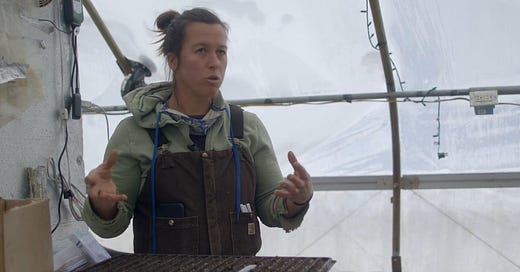Heartland: More Than Corn
This engaging documentary looks at a Noblesville farming couple who have made organic, farm-to-table not just a business model but an ethos about sustainability.
For Heartland Film Festival showtimes and tickets, click here.
Even as someone who grew up as an inveterate veggie-phobe, it’s hard not to watch “More Than Corn” and keep from smacking your lips.
Row upon row of the most gorgeous organic vegetables you’ve ever seen, hand-planted and -picked, glistening in an early spring morning Indiana dew or shining under a late summer sun. Radishes, salad turnips, snap peas, kale, carrots, tomatoes that look like they sprung forth from a pastoral painting — it’s practically food porn on the screen.
Directed and produced by Rocky Walls, “More Than Corn” follows the farmer couple who run Full Hand Farm over the course of the four seasons of 2021. They are a pair of Hoosiers who moved to Portland, Ore., got involved in the foodie scene through working in restaurants, started noodling with growing their own crops and moved back to Indiana, starting their own farm 10 years ago.
You may or may not have heard of Full Hand. But if you’ve eaten in any of Central Indiana’s tonier restaurants — including The Brassiere at Kan-Kan Cinema — then you’ve partaken of the plants grown by Genesis McKiernan-Allen and her partner, Eli Robb. Hoosier chefs rave about the quality of their veggies.
They also sell their stuff at the Broad Ripple and other farmers’ markets, plus preorder deliveries for foodies who like to eat by the seasonable timetable rather than what’s sitting limp on the shelf at the average local grocer. They’ve even started hosting occasional farm dinners with a menu straight from what just came from the field.
Genesis and Eli have taken the concept of farm-to-table and turned it from a business model to a life ethos built around sustainability. They’re practicing regenerative agriculture, the notion of planting different rotating crops with the season so the soil quality improves each year, rather than being burnt out by industrial planting of commodity crops that form the bulk of Indiana’s farming, aka corn and soybeans.
Genesis is the primary figure on our journey with Full Hand, an exuberant presence who loves to pick veggies straight out of the ground and crunch them between her teeth. They’ve now got two small children and are dealing with the same work/life struggles of any family business owner.
At one point she talks about taking a week’s vacation to visit with family at a lake house, something they’ve not been able to do for years. They returned to find their plantings of rutabaga and broccoli crowded out with weeds. Because they didn’t cultivate at the proper time, this crop will suffer for the next few seasons, or even years.
But Genesis doesn’t regret the family trip, calling it the right decision. “People over product… people over profit,” she says, espousing a notion that was once commonplace but nowadays seems radical.
We get to meet some of their employees, like Dara Zuckerman, who drives a 90-minute commute each today because of the chance to grow and learn, such as heading up a new enterprise of fresh flowers. Or Mitch McDaniel, a well-known Indiana chef who wants to learn the food business from the ground up — quite literally — so he can pursue more sustainable methods.
Walls infuses his documentary with not only insight and information about what it means to grow the ‘right way,’ but joy, laughter and a sense of genuine human warmth. Genesis jokes about tomatoes being a “gateway vegetable” to those who’ve never eaten fresh organic food, saying the amazing taste contrast with industrialized ‘maters is what turns many newbies into farm fresh devotees.
With Joe Frank’s gorgeous photography, we get to see a glimpse of every corner of Full Hand, from inside the greenhouses where they keep growing right through winter to the fields, back roads and eye-catching aerial shots. There’s a real sense of the seasons of life passing, with the planting of garlic bulbs marking the official end of one continuum and the beginning of the next. It’s the last thing to go into the ground, and the first to come up in the spring.
One of the things I’ve always boasted about living in the Indianapolis area is that you can be sitting at the downtown monument, point your vehicle in any direction and drive for 30 minutes, and you’ll probably be in the middle of farmland. You’re never very far away from where the food you eat is being grown.
This terrific documentary about a 25-acre oasis of old ideas about ‘growing well’ melded with new ones about our shared sense of community is a reminder that we’re all irrevocably tied to the earth, both for sustenance and as stewards.





